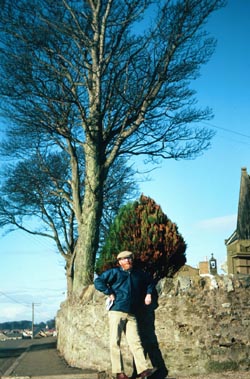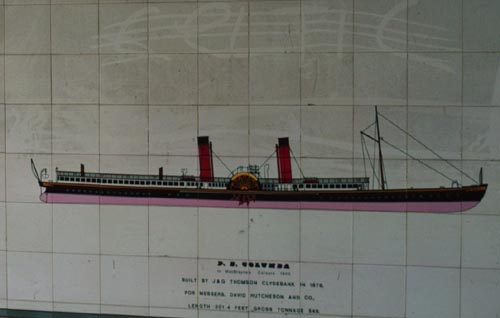Dancing at the Rascal Fair Background Notes
The divided heart of America
Here was the proposition: if the settler would live on the land a given number of years and "improve" it into yielding a planted crop, the government of the United States of America would give the settler that land. By the tens of thousands the takers of this most American of bets—the divvy of the continent against the perseverance of the individual—headed themselves west to take up homesteads.
 |
Finding a place in Scotland for the Rascal Fair characters to be from. |
The notion for my novel of Montana homesteaders tagged after me through life like a second shadow. My own western existence has bordered the lives of the last homestead generation, the settlers who poured into Montana between 1900 and 1918 under the spell of the dream of making the state "the last and best grain garden of the world." My father was born in a log homestead cabin south of Helena in 190l. And now that I am deep-bearded, I've been told continually by older Montanans of my resemblance to my father's long-lived uncle, D.L. Doig, the first of the family to come from Scotland to Montana.
To explore that haunting past, I invented the McCaskills and the Barclays, families who have in common with my own only their Scottish origins and a hard-won rural life in this country. The period I chose in this first of the chronology of my Two Medicine novels was 1889, Montana's year of statehood, to the devastating winter of 1919. And the voice I chose to do the narration is that of Angus McCaskill. Early in his telling of it all, while he and his lifelong chum Rob Barclay are aboard the steamship bound to America, Angus says:
"We had a book—Crofutt's Trans-Atlantic Emigrants" Guide—and my malady was right there in it, page one. Crofutt performed as our tutor that a shilling was worth 24 American cents, and how much postal stamps cost there in the big country, and that when it came midnight in old Scotland the clocks of Montana were striking just five of the afternoon. Crofutt told this, too, I can recite it yet today: 'Do not emigrate in a fever, but consider the question in each and every aspect. The mother country must be left behind, the family ties, all old associations, broken. Be sure that you look at the dark side of the picture: the broad Atlantic, the dusty ride to the great West of America, the scorching sun, the cold winter—coldest ever you experienced!—and the hard work of the homestead. But if you finally, with your eyes open, decide to emigrate, do it nobly. Do it with no divided heart.'"
 |
A River Clyde steamship of Angus and Rob's era |
But the heart of Angus is divided, and therein is the storyline, I saw. Put simply, Dancing at the Rascal Fair became the tale of these two inseparable friends, Scotland-leavers together, neighbors on the Montana homestead frontier, who became enemies over what one of them does to a woman they both love. Apparently others share my own affair of the heart with the homesteaders and their dramatic lives; this is the book that has outsold any of my others, even This House of Sky.